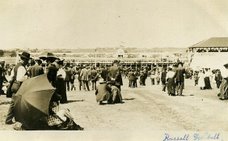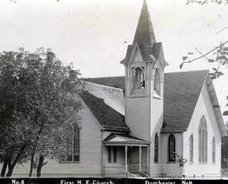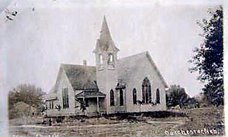Community survival is on the minds of many small-town residents nowadays.
Several years ago in an editorial, we mentioned that Dorchester has been able to escape school consolidation and loss of population, both of which are crippling many small Plains' communities. But our community is not immune to the struggles facing small town America.
However, all six staff members of the Dorchester Times wholeheartedly believe there is an escape from the major urban areas, as Americans -- young and old alike -- look towards rural communities for safety, sanity, affordability, and the need to connect with neighbors who share their values.
This time in history presents a perfect opportunity for Dorchester residents to decide what they want their community to look like five, 10, or 20 years from now -- and beyond.
VISIONS magazine -- published by the non-profit Heartland Center for Leadership Development -- several years ago ran a list of "20 clues to community survival." The list wasn't a recipe, nor did it represent the checklist for a perfect small town, according to the authors of the study from which the list was derived. However, we think the list serves as a useful tool for goal-setting in Dorchester.
CLUES TO COMMUNITY SURVIVAL
1.) Evidence of Community Pride. "Successful communities are often showplaces of care, attention, history and heritage," the study says. (This also includes loyalty among residents and school alumni.)
2.) Emphasis on Quality in Business & Community Life.
3.) Willingness to Invest in the Future. "In addition to the brick-and-mortar investments, all decisions are made with an outlook on the future."
4.) Participatory Approach to Community Decision Making. ("Even the most powerful opinion leaders seem to work toward building consensus.")
5.) Cooperative Community Spirit. This speaks for itself.
6.) Realistic Appraisal of Future Opportunities. "Successful communities have learned how to build on strengths and minimize weaknesses."
7.) Awareness of Competitive Positioning. "Local loyalty is emphasized in successful small towns, but thriving communities know who their local competitors are and position themselves accordingly."
8.) Active Economic Development Program. "There is an organized, public/private approach to economic development."
9.) Knowledge of the Physical Environment. "Relative location and available natural resources underscore decision-making."
10.) Deliberate Transition of Power to a Younger Generation of Leaders. "People under 40 regularly hold key positions in civic and business affairs in strong communities."
11.) Celebration of Diversity in Leadership. "Young people and newcomers are elected officials, business leaders, and entrepreneurial developers."
12.) Strong Belief in and Support for Education.
13.) Problem-Solving Approach to Providing Health Care and Housing Older Residents.
14.) Strong Multi-Generational Family Orientation. "The definition of family is broad, and activities include younger as well as older generations."
15.) Strong Presence of Traditional Institutions are Integral to Community Life. "Churches, schools and service clubs are strong influences on community development and the social network."
16.) Sound and Well-Maintained Infrastructure. "Leaders work to maintain streets, Main Street buildings, water systems and sewage facilities."
17.) Careful Use of Fiscal Resources.
18.) Sophisticated Use of Technology Resources.
19.) Willingness to Seek Help from the Outside. "People seek outside help for community needs, and many compete for government grants and contracts for projects and services."
20.) Conviction That, in the Long Run, You Must Do It Yourself. "Thriving rural communities believe their destiny is in their own hands. Making their communities good places is a pro-active assignment, and they are willing to accept it."



















































No comments:
Post a Comment
Village Dweller checks all reader comments to determine if they are appropriate for print.